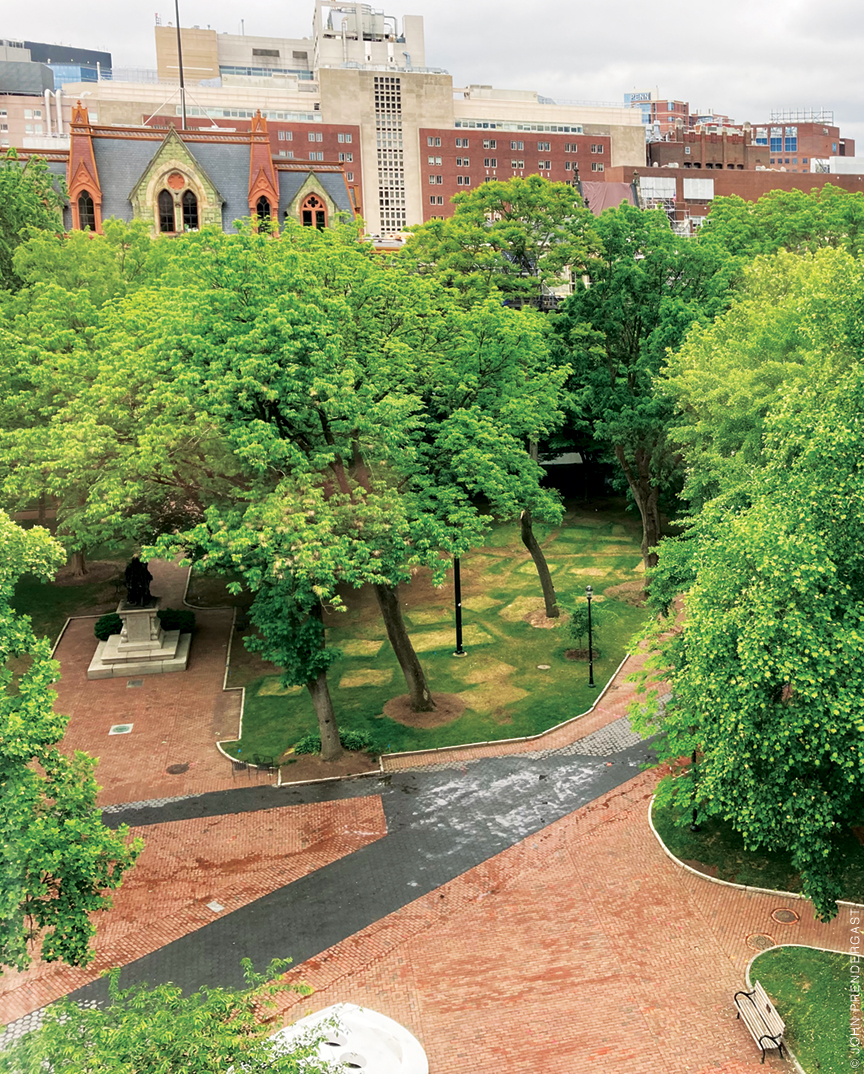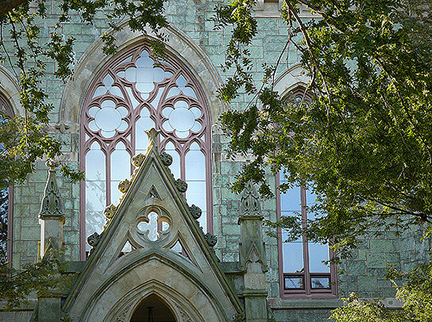
This spring saw pro-Palestinian encampments appear on college campuses across the country. The one at Penn lasted 16 days before being cleared.
On the afternoon of April 25, Penn Interim President J. Larry Jameson and Provost John Jackson Jr. had scheduled a community listening session at Perry World House, inviting “students, faculty, and staff to share their thoughts on the impacts of the conflict in the Middle East on our campus,” in light of what Jameson called “the turbulence and strife taking place on several university campuses across the country.”
But that attempt at dialogue was overshadowed by the simultaneous formation of Penn’s Gaza Solidarity Encampment by marchers heading west from an earlier protest at City Hall and students and faculty who were staging a walkout at the Split Button. Beginning with about 10 tents, the encampment gradually swelled to 40 or so pitched on the green fronting the west side of College Hall. Protesters’ demands included that Penn disclose all investments “in the spirit of transparency and shared governance”; divest from companies “that profit from Israel’s war on Gaza and occupation in Palestine” and cut academic ties with Israel; and offer amnesty to all involved in pro-Palestinian protests.
After writing that Penn was “closely monitoring the encampment,” Jameson, Jackson, and Senior Executive Vice President Craig Carnaroli W’85 followed up on April 26 with a statement charging that the encampment itself violated Penn’s facilities policies and that the “harassing and intimidating comments and actions” of some protesters had violated the University’s open expression guidelines as well as Title VI of the Civil Rights Act. They called for the protesters to disband the encampment immediately or face “sanctions consistent with our due process and procedures as they apply to students, faculty, and staff.”
In addition to Penn students, the encampment attracted students from Temple, Drexel, and other local colleges, as well as Philadelphia community members. There were Jewish students among the protesters, and the encampment also was met with pro-Israel counterprotests. A variety of petitions were circulated supporting the encampment and calling for its disbandment.
Over its 16 days of existence (based on reports in the Daily Pennsylvanian and local media, along with a few Gazette staff visits to the site) the atmosphere at the encampment varied; the mood was at times peaceful and at others loud and confrontational. The number of protesters at times swelled into the hundreds, on several occasions prompting alerts from Penn’s Department of Public Safety, and chants included use of contested phrases such as “from the river to the sea” and references to “Zionist pigs.”
The Ben Franklin statue on College Green was a frequent centerpiece for protest activity, repeatedly draped in Palestinian flags and keffiyehs while protesters perched on the statue’s pediment waving flags. It was on several occasions graffitied with slogans and symbols, including the image of an inverted red triangle, sometimes seen as a general symbol of Palestinian resistance but also associated with the Hamas military.
As the University held off on acting, initial hopes for a resolution were replaced by accusations of bad faith on both sides. In a May 6 statement, Jameson said the protesters’ responses in two meetings “reflect an unwillingness to negotiate on reasonable terms to a conclusion” and expressed concern that some in the encampment were looking for a confrontation, citing “reports of circulating documents with instructions for escalating a protest, including through building occupations and violence.” During one of the larger protest rallies on May 8, the encampment expanded to the east side of College Green.
Early in the morning of May 10, Penn Police, with Philadelphia Police also on the scene, moved to disband the camp, arresting 33 people (including nine students), who were charged and released. Tents, signage, and other gear were destroyed, and the area around College Green was fenced off.
In a statement, the administration called its decision “an unfortunate but necessary step to prevent violence, restore operations, and return our campus to our community.” Protesters, despite being informed that they were violating University policies, “refused repeatedly to disband the encampment, to produce identification, to stop threatening, loud, and discriminatory speech and behavior, and to comply with instructions from Penn administrators and Public Safety.”
The statement added that the administration had made it clear that it would not meet the protesters’ demands for amnesty outside normal disciplinary procedures and that “Penn remains unequivocally opposed to divestment,” which in any case is “unlawful for institutions receiving funding from the Commonwealth of Pennsylvania.” It also emphasized that the decision was “viewpoint neutral and affirmed by our policies,” the result of “balancing free speech with our responsibility to safety, security, and continuing the operations of the University.”
A handful of faculty supporters tried to nonviolently block a police van taking students away for processing the morning of the encampment’s disbandment, and the chair of the Faculty Senate, political science professor Tulia Falleti, resigned her Faculty Senate position, writing that she was “no longer confident of my ability to work collaboratively with our administration that has sent in the police to arrest its own students, staff, and faculty.” The Penn chapter of the American Association of University Professors (AAUP) issued a statement condemning the administration’s actions as “a cowardly, shameful attempt to silence and punish speech that administrators simply do not want to hear.”
The encampment caused the relocation of end-of-year events including Hey Day, which was moved to Annenberg Plaza, and more recently developed rituals involving the sophomore class (U-Night) and seniors (Final Toast), held on Hill Field and Shoemaker Green, respectively.
College Green remained fenced off through Alumni Weekend and Commencement. Those events went forward largely without disruption, though an attempt, quickly thwarted, was made on May 17 to occupy Fisher-Bennett Hall, in which 19 people were arrested, including seven Penn students. Several students undergoing disciplinary proceedings were barred from graduation exercises, and the University later banned 24 people not affiliated with Penn who were involved in protests from campus. —JP




